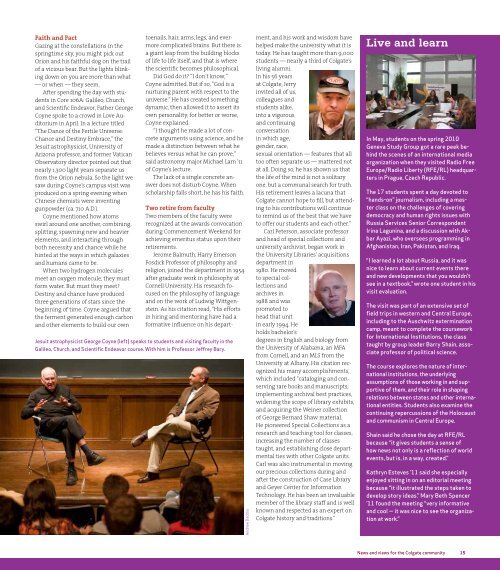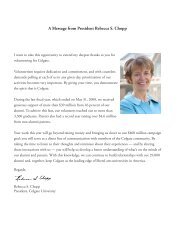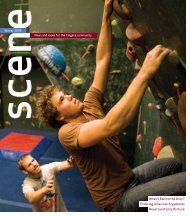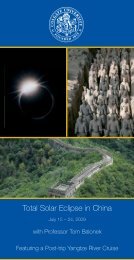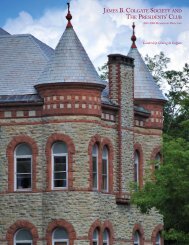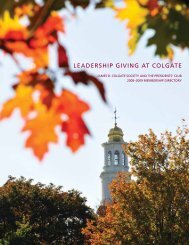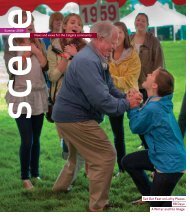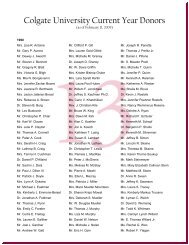101 Things To Do Before You Graduate Living In History ... - Alumni
101 Things To Do Before You Graduate Living In History ... - Alumni
101 Things To Do Before You Graduate Living In History ... - Alumni
Create successful ePaper yourself
Turn your PDF publications into a flip-book with our unique Google optimized e-Paper software.
Faith and Fact<br />
Gazing at the constellations in the<br />
springtime sky, you might pick out<br />
Orion and his faithful dog on the trail<br />
of a vicious bear. But the lights blinking<br />
down on you are more than what<br />
— or when — they seem.<br />
After spending the day with students<br />
in Core 106A: Galileo, Church,<br />
and Scientific Endeavor, Father George<br />
Coyne spoke to a crowd in Love Auditorium<br />
in April. <strong>In</strong> a lecture titled<br />
“The Dance of the Fertile Universe:<br />
Chance and Destiny Embrace,” the<br />
Jesuit astrophysicist, University of<br />
Arizona professor, and former Vatican<br />
Observatory director pointed out that<br />
nearly 1,300 light years separate us<br />
from the Orion nebula. So the light we<br />
saw during Coyne’s campus visit was<br />
produced on a spring evening when<br />
Chinese chemists were inventing<br />
gunpowder (ca. 710 A.D.).<br />
Coyne mentioned how atoms<br />
swirl around one another, combining,<br />
splitting, spawning new and heavier<br />
elements, and interacting through<br />
both necessity and chance while he<br />
hinted at the ways in which galaxies<br />
and humans came to be.<br />
When two hydrogen molecules<br />
meet an oxygen molecule, they must<br />
form water. But must they meet?<br />
Destiny and chance have produced<br />
three generations of stars since the<br />
beginning of time. Coyne argued that<br />
the ferment generated enough carbon<br />
and other elements to build our own<br />
toenails, hair, arms, legs, and evermore<br />
complicated brains. But there is<br />
a giant leap from the building blocks<br />
of life to life itself, and that is where<br />
the scientific becomes philosophical.<br />
Did God do it? “I don’t know,”<br />
Coyne admitted. But if so, “God is a<br />
nurturing parent with respect to the<br />
universe.” He has created something<br />
dynamic, then allowed it to assert its<br />
own personality, for better or worse,<br />
Coyne explained.<br />
“I thought he made a lot of concrete<br />
arguments using science, and he<br />
made a distinction between what he<br />
believes versus what he can prove,”<br />
said astronomy major Michael Lam ’11<br />
of Coyne’s lecture.<br />
The lack of a single concrete answer<br />
does not disturb Coyne. When<br />
scholarship falls short, he has his faith.<br />
Two retire from faculty<br />
Two members of the faculty were<br />
recognized at the awards convocation<br />
during Commencement Weekend for<br />
achieving emeritus status upon their<br />
retirements.<br />
Jerome Balmuth, Harry Emerson<br />
Fosdick Professor of philosophy and<br />
religion, joined the department in 1954<br />
after graduate work in philosophy at<br />
Cornell University. His research focused<br />
on the philosophy of language<br />
and on the work of Ludwig Wittgenstein.<br />
As his citation read, “His efforts<br />
in hiring and mentoring have had a<br />
formative influence on his depart-<br />
Jesuit astrophysicist George Coyne (left) speaks to students and visiting faculty in the<br />
Galileo, Church, and Scientific Endeavor course. With him is Professor Jeffrey Bary.<br />
Andrew Daddio<br />
ment, and his work and wisdom have<br />
helped make the university what it is<br />
today. He has taught more than 9,000<br />
students — nearly a third of Colgate’s<br />
living alumni.<br />
<strong>In</strong> his 56 years<br />
at Colgate, Jerry<br />
invited all of us,<br />
colleagues and<br />
students alike,<br />
into a vigorous<br />
and continuing<br />
conversation<br />
in which age,<br />
gender, race,<br />
sexual orientation — features that all<br />
too often separate us — mattered not<br />
at all. <strong>Do</strong>ing so, he has shown us that<br />
the life of the mind is not a solitary<br />
one, but a communal search for truth.<br />
His retirement leaves a lacuna that<br />
Colgate cannot hope to fill, but attending<br />
to his contributions will continue<br />
to remind us of the best that we have<br />
to offer our students and each other.”<br />
Carl Peterson, associate professor<br />
and head of special collections and<br />
university archivist, began work in<br />
the University Libraries’ acquisitions<br />
department in<br />
1980. He moved<br />
to special collections<br />
and<br />
archives in<br />
1988 and was<br />
promoted to<br />
head that unit<br />
in early 1994. He<br />
holds bachelor’s<br />
degrees in English and biology from<br />
the University of Alabama, an MFA<br />
from Cornell, and an MLS from the<br />
University at Albany. His citation recognized<br />
his many accomplishments,<br />
which included “cataloging and conserving<br />
rare books and manuscripts,<br />
implementing archival best practices,<br />
widening the scope of library exhibits,<br />
and acquiring the Weiner collection<br />
of George Bernard Shaw material.<br />
He pioneered Special Collections as a<br />
research and teaching tool for classes,<br />
increasing the number of classes<br />
taught, and establishing close departmental<br />
ties with other Colgate units.<br />
Carl was also instrumental in moving<br />
our precious collections during and<br />
after the construction of Case Library<br />
and Geyer Center for <strong>In</strong>formation<br />
Technology. He has been an invaluable<br />
member of the library staff and is well<br />
known and respected as an expert on<br />
Colgate history and traditions.”<br />
Live and learn<br />
<strong>In</strong> May, students on the spring 2010<br />
Geneva Study Group got a rare peek behind<br />
the scenes of an international media<br />
organization when they visited Radio Free<br />
Europe/Radio Liberty (RFE/RL) headquarters<br />
in Prague, Czech Republic.<br />
The 17 students spent a day devoted to<br />
“hands-on” journalism, including a master<br />
class on the challenges of covering<br />
democracy and human rights issues with<br />
Russia Services Senior Correspondent<br />
Irina Lagunina, and a discussion with Akbar<br />
Ayazi, who oversees programming in<br />
Afghanistan, Iran, Pakistan, and Iraq.<br />
“I learned a lot about Russia, and it was<br />
nice to learn about current events there<br />
and new developments that you wouldn’t<br />
see in a textbook,” wrote one student in his<br />
visit evaluation.<br />
The visit was part of an extensive set of<br />
field trips in western and Central Europe,<br />
including to the Auschwitz extermination<br />
camp, meant to complete the coursework<br />
for <strong>In</strong>ternational <strong>In</strong>stitutions, the class<br />
taught by group leader Barry Shain, associate<br />
professor of political science.<br />
The course explores the nature of international<br />
institutions, the underlying<br />
assumptions of those working in and supportive<br />
of them, and their role in shaping<br />
relations between states and other international<br />
entities. Students also examine the<br />
continuing repercussions of the Holocaust<br />
and communism in Central Europe.<br />
Shain said he chose the day at RFE/RL<br />
because “it gives students a sense of<br />
how news not only is a reflection of world<br />
events, but is, in a way, created.”<br />
Kathryn Esteves ’11 said she especially<br />
enjoyed sitting in on an editorial meeting<br />
because “it illustrated the steps taken to<br />
develop story ideas.” Mary Beth Spencer<br />
’11 found the meeting “very informative<br />
and cool — it was nice to see the organization<br />
at work.”<br />
News and views for the Colgate community<br />
15


